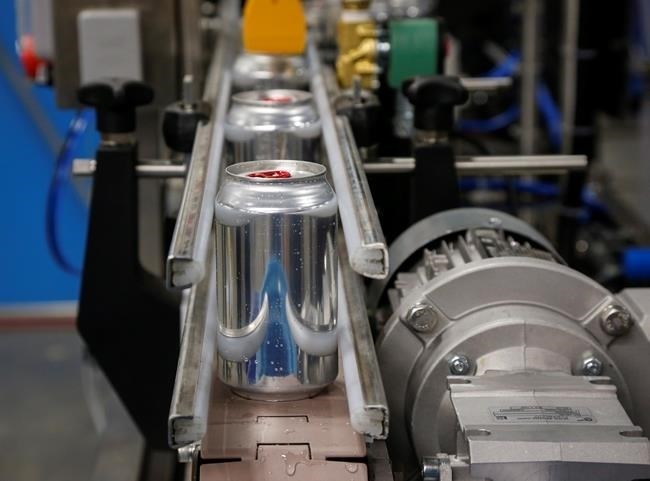
President Peter Love of Cask Global Canning Solutions says his micro-canning machines for micro-breweries have been installed in 725 locations in 44 countries since 2002. One of the company's canning machines going through testing at the factory in Calgary, Alta., Monday, Feb. 6, 2017.
Image Credit: THE CANADIAN PRESS/Jeff McIntosh
February 12, 2017 - 1:00 PM
CALGARY - For a certain generation of connoisseur, beer sold in aluminum cans cannot call itself "craft beer."
But that's changing to the relief of Peter Love, whose family-owned Calgary manufacturing business specializes in small-scale canning machines aimed at the craft brewing market.
"We have a snobby industry," concedes the 65-year-old president of Cask Brewing Systems Inc.
Love has been trying to change beer snob attitudes since 1999, when his company came up with a manual canning system to sell to customers making small amounts of beer in brew-on-premises businesses in Ontario.
Three years later, he introduced the product to a perplexed industry at the Craft Brewers Conference in Cleveland.
"I had one guy come up to me and say, 'That's the dumbest idea I've ever heard. What craft brewer would ever put their beer into an aluminum can?'" recalls Love.
"(Now) we have 725 customers in about 44 countries around the world."
He said Cask expects to install 100 to 120 systems this year, about the same as in 2016, adding to a client list that includes breweries in Canada, the U.S., Australia, England and Svalbard, Norway (an island about 1,200 kilometres from the North Pole).
Ottawa's Beyond The Pale Brewing Co. started out selling beer in one-and two-litre glass bottles called growlers four years ago, but added a canning system — a second-hand Cask product — two years ago in response to customer demand, says co-owner Rob McIsaac.
"We love canned beer," said McIsaac. "If you are trying to put out a premium product, it's better for the beer to be in cans. It's more convenient, it's better for the environment, it makes a lot of sense."
He said the company still sells beer in bottles and growlers but most of the 400,000 litres it sold last year went out the door in cans.
Cask's target market keeps growing. The number of small breweries in Canada producing less than 200,000 litres per year rose from 220 in 2010 to 490 in 2015, according to Beer Canada, an Ottawa-based trade association. Meanwhile, the overall volume of beer sold in cans in Canada increased 7.3 per cent while bottled beer declined by 9.2 per cent.
The U.S. Brewers Association reports two per cent of the total volume from craft breweries in the U.S. was packaged in cans in 2011. Now it's up to 12 per cent.
Cask has grown from a handful of staff five years ago to more than 35 now and Love says he is considering expanding beyond the cramped quarters of his Calgary warehouse and assembly plant.
The company sells four canning machines, ranging from a manual canner capable of 10 cans per minute to a fully automated system that can do 75 cans a minute. They range in price from $25,000 to $250,000.
It also acts as an agent for an American company that makes and prints the cans.
Love says the test of a canning system is its ability to fill and seal cans without allowing oxygen — which produces a skunky flavour — into the beer.
Cask's automated systems use a purging nozzle that shoots carbon dioxide into the can ahead of the beer, pushing the oxygen out. And temperature is vital — Cask insists that the beer be chilled to between zero and two degrees C before entering the can.
Love said the company wants to increase sales in Europe and Asia and is trying to get into new applications in canning such as cold brewed coffee, soft drinks, energy drinks and tea.
News from © The Canadian Press, 2017